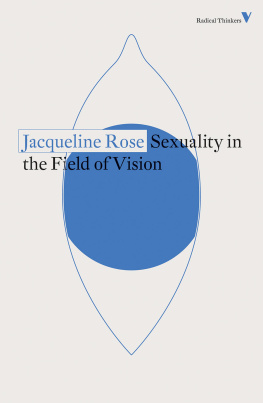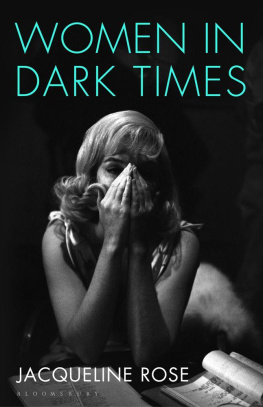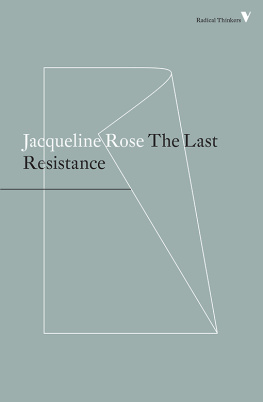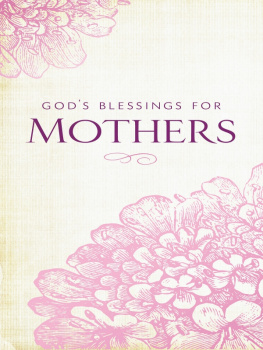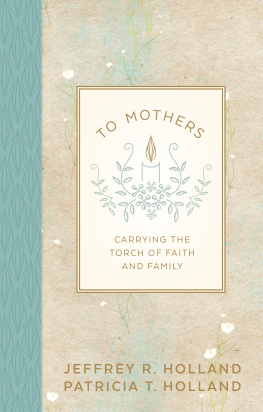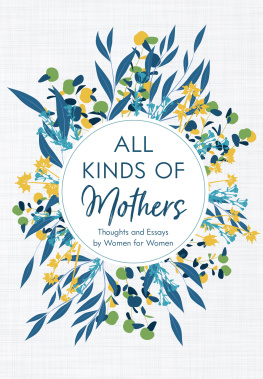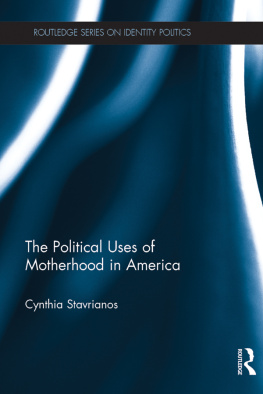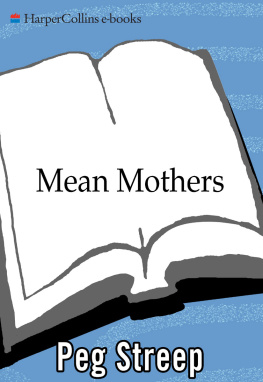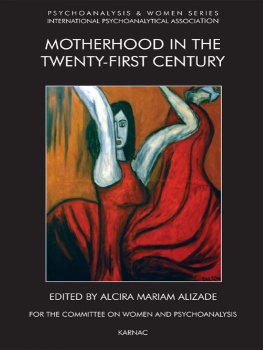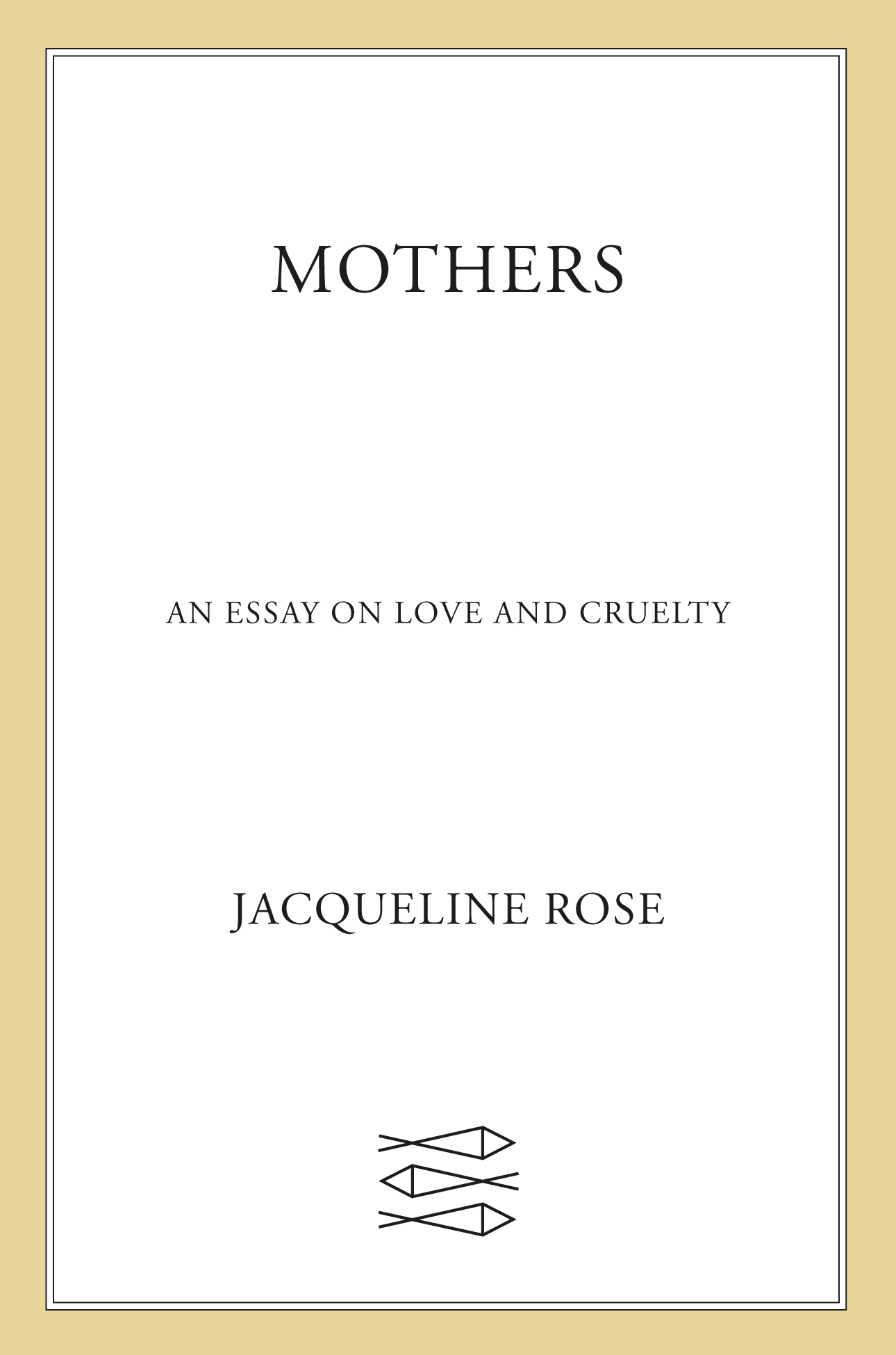Contents
Guide
Pagebreaks of the print version

The author and publisher have provided this e-book to you for your personal use only. You may not make this e-book publicly available in any way. Copyright infringement is against the law. If you believe the copy of this e-book you are reading infringes on the authors copyright, please notify the publisher at: us.macmillanusa.com/piracy.
For Lynn Rose And for Jeanette Stone With my love
HERMIONE : You gods, look down,
And from your sacred vials pour your graces
Upon my daughters head!
Shakespeare, The Winters Tale
I suppose that is what we want from our mothers: to maintain the world and, even if it is a lie, to proceed as though the world could be maintained.
Hisham Matar, The Return
Oh God. Is there still mother after death?
Ali Smith, Autumn
A simple argument guides this book: that motherhood is, in Western discourse, the place in our culture where we lodge, or rather bury, the reality of our own conflicts, of what it means to be fully human. It is the ultimate scapegoat for our personal and political failings, for everything that is wrong with the world, which it becomes the task unrealisable, of course of mothers to repair. To the familiar claim that too much is demanded of mothers, which has been a long-standing feminist plaint, this book will add a further dimension, or question. What are we doing what aspects of our social arrangements and of our inner lives, what forms of historic injustice, do we turn our backs on; above all, what are we doing to mothers when we expect them to carry the burden of everything that is hardest to contemplate about our society and ourselves? Mothers cannot help but be in touch with the most difficult aspects of any fully lived life. Along with the passion and pleasure, it is the secret knowledge they share. Why on earth should it fall to them to paint things bright and innocent and safe? Running through the book is a central contention: that by making mothers the objects of licensed cruelty, we blind ourselves to the worlds iniquities and shut down the portals of the heart. Unless we recognise what we are asking mothers to perform in the world and for the world we will continue to tear both the world and mothers to pieces.
On 12 October 2016, The Sun s front-page headline was Here for maternity. According to its report, splashed over half the page, a National Health Service hospital had been used by nine hundred pregnant health tourists in the previous year at a cost to the UK taxpayer of around 4 million in unpaid bills. Officials (unidentified) were quoted as stating that deliveries from non-EU mums accounted for a fifth of all births in St Georges Hospital in Tooting, South London. The hospital read the nation was being deluged, an easy target for fixers in Nigeria who were charging women to use the NHS. The Sun leader, entitled Unhealthy cost, described the scandal as sickening (the puns on unhealthy and sickening presumably intentional), and railed against the 2 billion blown on foreign tourists with no right to free NHS care each year.
In response to this crisis, the hospital was planning to request ID or proof of asylum from incoming patients in the maternity ward. The article was illustrated with a photo of Bimbo Ayelabola, a Nigerian mother who gave birth to quintuplets by caesarean section at Homerton University Hospital in 2011 at a cost of 200,000 to the NHS. Despite the nod to fixers in Nigeria, the image of Ayelabola, holding her five babies, had clearly been chosen to reinforce the age-old stereotype of blacks and the poor reproducing irresponsibly and to excess. Abandoned by her wealthy Nigerian husband, The Sun wrote, she was believed to be still living in the UK with her children, and no doubt claiming benefits, to which, it was implied, she would not be entitled. The subliminal or not so subliminal message of the article was therefore: Get this mother out (the paper just about refrained from suggesting that she should be hunted down). The unions may baulk at medics acting as border guards, the leader commented, but the NHS has an army of administrators who need to toughen up. Apparently, a military response was needed to deal with the scheming dereliction of foreign mothers, who were a threat to the nations values and resources alike. In The Sun online (12 October 2016), the article was re-titled Up the Bluff, as if these women might not even be pregnant.
Why are these mothers so hated? Why are mothers so often held accountable for the ills of the world, the breakdown in the social fabric, the threat to welfare, to the health of the nation from the funding crisis in the NHS to the influx of foreigners on our shores? Why are mothers seen as the cause of everything that doesnt work in who we are? We are living in an increasingly fortified world, with walls, concrete and imaginary, being erected across national boundaries, reinforcing the distinctions between peoples. From all sides, in Europe and the US, we are accosted by increasingly shrill voices, telling us that our greatest ethical obligation is to entrench our national and personal borders, to be unfailingly self-regarding and sure of ourselves. It is a perfect atmosphere for picking on mothers, for branding them as uniquely responsible for both securing and jeopardising this impossible future.
The Sun was not alone in this particular brand of vitriol. A few months later, in January 2017, the Daily Mail headlined its front page: One health tourists 350,000 bill and you paid! with reference to another Nigerian mother who had come to the UK to give birth on the NHS, this time to twins. Inside its pages the paper reprinted the photo of Ayelabola with her five babies: Havent we fallen for this before? The figure of 350,000 must have been carefully chosen since it echoes the 350 million that Brexit campaigners had falsely claimed would, on a weekly basis, revert to the UK from Europe straight into the coffers of the NHS (which makes the broken promise somehow these mothers fault). The Sun and the Daily Mail are the countrys most right-wing newspapers, but such rhetoric is not without wider effect. According to charity reports from across the UK, hundreds of pregnant foreign women were avoiding antenatal care because they feared being reported to the Home Office or facing costly medical bills. One NHS trust has been sending letters to women with complex asylum claims saying that their maternity care will be cancelled if they fail to bring credit cards to pay fees of more than 5,000. It is also worth noting that, without qualification or apology, The Sun and Daily Mail felt able to issue this onslaught on mothers on the verge, or indeed in the process, of giving birth the minimal requirement of motherhood, one might say. In this, they are by no means unique. As we will see, tormenting mothers is something of a pastime in the so-called civilised world.
Here for maternity echoes the title of the 1953 Fred Zinnemann film From Here to Eternity , a phrase which has passed into common parlance in the English-speaking world to evoke a love that will follow its object to the ends of the earth, even if the price is death the eternity/ maternity echo of the Sun front page suggests that, without drastic action, we are stuck with this problem, with these mothers, for ever. The film is set in the days before Pearl Harbor. Montgomery Clift plays a boxer who refuses to fight with his army mates and prefers to play the bugle, is subjected to cruel treatment by his captain, and is finally killed during the attack. A sergeant (Burt Lancaster) who befriends the Clift character starts an affair with the captains wife (Deborah Kerr). The film therefore has all the ingredients for locker talk combined with heterosexual passion. But there is a dark side in relation to mothers. In the novel the film is based on, the captains wife had a hysterectomy after her unfaithful husband infected her with gonorrhoea. To meet Production Code standards, the film changed this to a miscarriage (there could be no mention of venereal disease). In the film, the husband is still a philanderer, but it is the womans own body that has failed her, robbing her of the possibility of motherhood. The fact that male sexual licence during the war might be putting potential mothers at risk could not be spoken. In a film that goes some way to exposing the cult of masculinity in the army, motherhood is an aside, like the irritating drip of a tap. At the opposite end from the Sun article, although drawing on some of the same degraded impulses, mothers in this film slip in and out mostly out of focus. This, I will be suggesting, is a pattern. In modern-day Western culture, mothers are almost invariably the object, either of too much attention or not enough.


